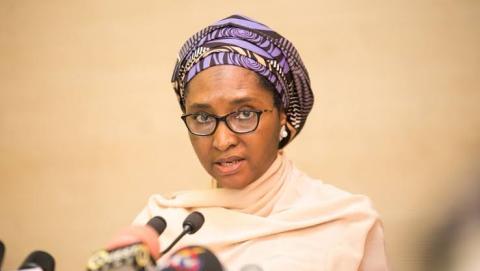
The Minister of Finance, Mrs Zainab Ahmed, made this known on Monday while addressing some stakeholders at a public hearing on the 2021 Finance Bill organised by the House of Representatives Committee on Finance in Abuja.
The Muhammadu Buhari-led government has stated that new tariffs and levies would be introduced in 2022 to put the economy on a recovery path.
The Minister of Finance, Mrs Zainab Ahmed, made this known on Monday while addressing some stakeholders at a public hearing on the 2021 Finance Bill organised by the House of Representatives Committee on Finance in Abuja.

According to Vanguard, she said that a couple of reforms and amendments had been recommended in the draft 2021 Finance amendment bill, saying that more reforms would be introduced by the middle of 2022.
She explained that while modest changes had been proposed, more fiscal reforms were in view as the ministry could not take all the proposals collected from stakeholders.
“Our aspiration is to do a midterm review with a possibility of another Finance Bill in mid-year 2022 to bring in more amendments. There are ongoing cases in court against the Federal Government on the Value Added Tax (VAT) and stamp duties, which was why the ministry stayed off those areas,” she said.
“We prepared this draft bill along five reform areas, the first domestic revenue mobilisation, the second is tax administration and legislative drafting, third is International taxation, fourth is financial sector reforms and tax equity and fifth is improving public financial management reform.
“The provision in the draft bill is proposing to amend the Capital Gains Tax Act, Company Income Tax, FIRS Establishment Act, Personal Income Tax, Stamp Duties Act and Tertiary Education Act, Value Added Tax, Insurance Police Trust Fund and the Fiscal Responsibility Act.
“This is to amend the Police Trust Fund Act and the Nigerian Trust Fund Acts, the purpose is to empower the FIRS to collect the Nigerian trust fund levies on companies on behalf of the fund itself.
“Currently, because there is no such provision, the FIRS is unable to start collecting on behalf of the fund. Also, it is to streamline the tax and the levy collection from the Nigerian companies in line with Mr. President’s administration ease of doing business policy.
“So we do not have NASENI going out to collect that tax, the FIRS will collect on their behalf during their collection process and it will be passed through to them,” she added.
Ahmed said that the bill was a product of the President Muhmmadu Buhari’s commitment made while presenting the 2022 budget to the joint session of the National Assembly on October 8, 2021.
She said that the ministry had worked with relevant stakeholders and Fiscal Policy Reform Committee to draft the 2021 Finance bill.